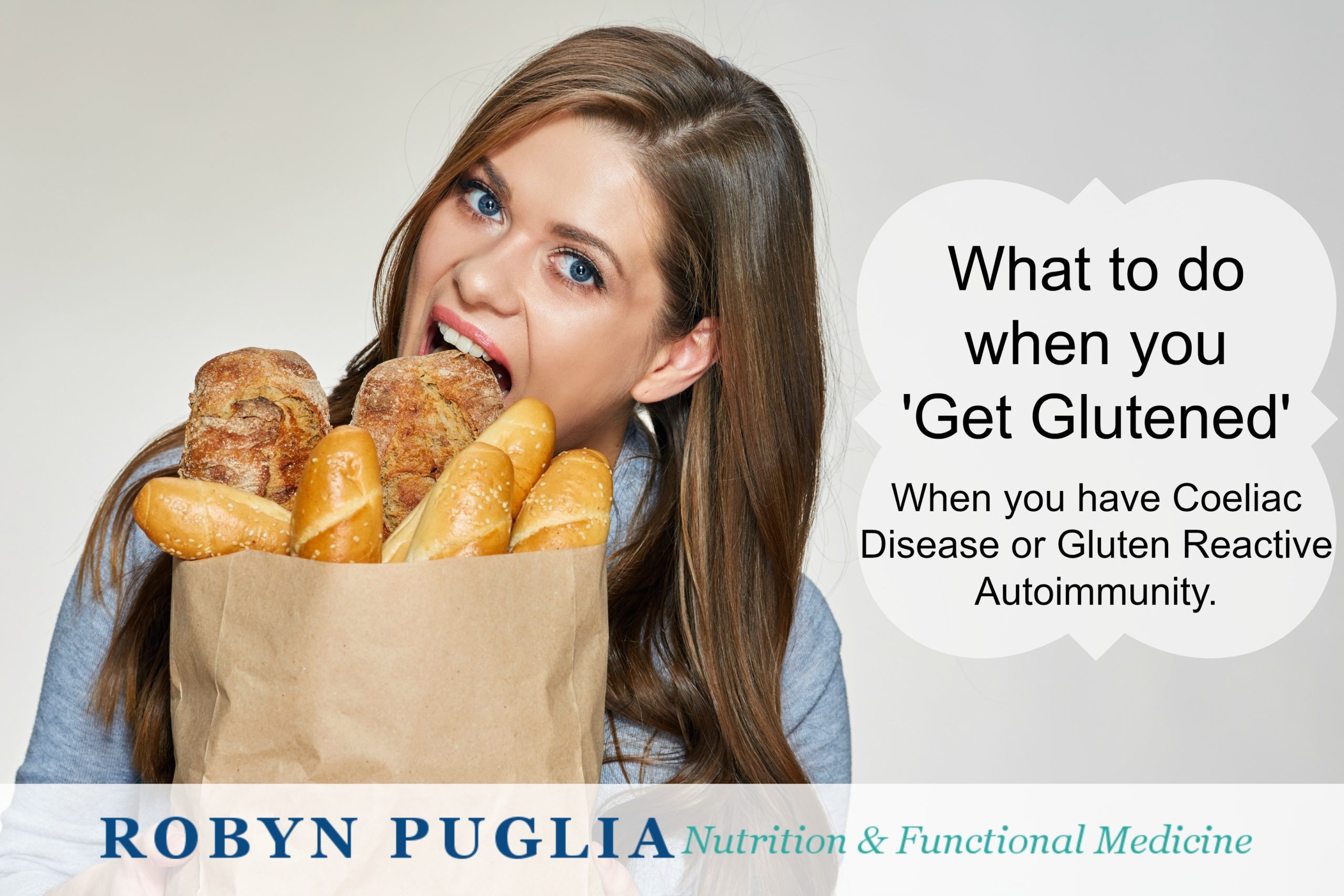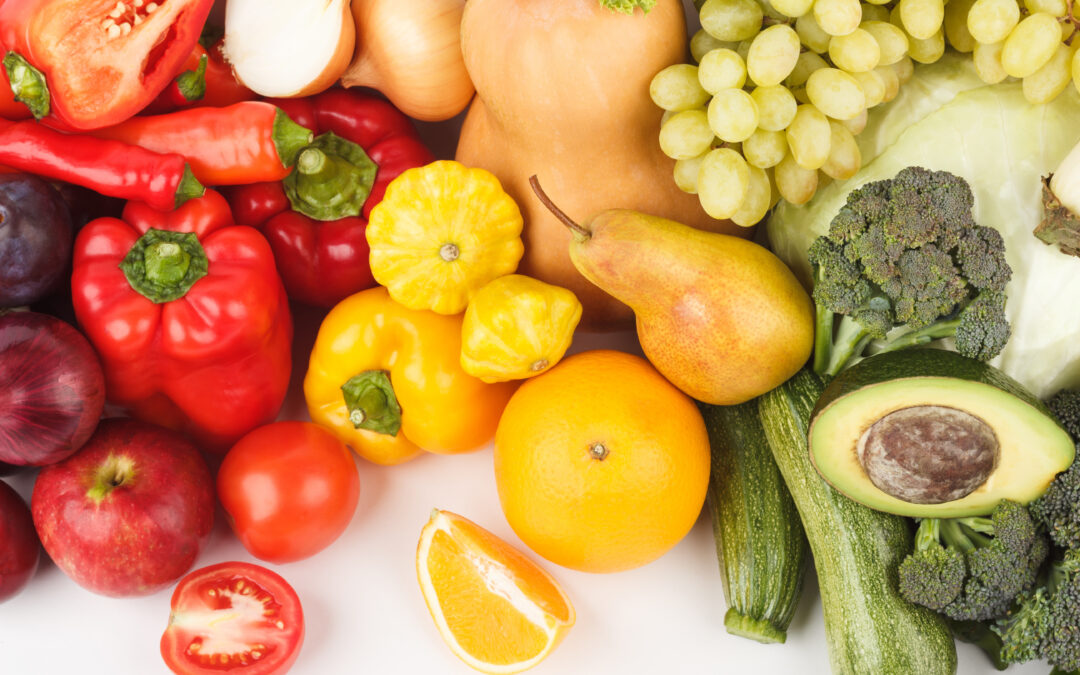If you have Coeliac Disease (celiac disease, CD) or any other gluten-reactive autoimmune disease, no matter how careful you are there will come a time when you will accidentally be exposed to gluten (often referred to by the community as being Glutened).
To avoid this it can sometimes feel like you almost have to be a paranoid hermit! Only eating food that you have prepared yourself, in your own home, in a completely gluten-sterile environment. You may feel like other people cannot be trusted, especially restaurants, wedding caterers, sceptical or forgetful family members etc.
While that extreme level of care does help you physically to avoid gluten, it also brings with it social isolation, social deprivation and feelings of loneliness and stress – all of which are detrimental to health, the immune system, happiness and wellbeing.
So lets assume that you need to just live a more normal, social, life and every now and then you unfortunately have to deal with getting glutened.
Over the years I have devoured as many other posts and articles as I could find on this subject, both in the name of my own healing and also to see what other people find helpful or works for them. A lot of the info was anecdotal (as many health forums online are), and a lot focused solely on the gut. Just a few mentioned using anti-inflammatory agents, mostly as they help with extra-intestinal symptoms, such as joint pain.
Well, of course I do feel like it’s very important to address all of the above, but I also think it’s critical to remember that CD is NOT “solely a disease of the gut”. It is an immune system issue that affects the gut! I definitely think it’s a mistake for the medical community at large to stop their thinking about CD at the gut, and I think it’s important for the individual with CD to think outside the gut when it comes to healing too.
To my mind, there are four areas you need to consider when you get glutened.
- THE GUT
- THE BODY
- THE IMMUNE SYSTEM
- STRESS, SLEEP AND SELF-CARE
1. The Gut.
Despite all of my ‘think outside the gut’ talk, of course we do actually need to start with the gut! Just don’t stop the thinking there. When someone with coeliac disease is exposed to gluten, the immune system starts to damage the villi of the gut via specific inflammatory responses. This may manifest as gut symptoms, or it may be silent, but if you have CD, it’s true every time.
Within the gut though, there are three different areas for consideration.
1a. Digestive Support.
The small intestine is the seat of some very important digestive features! When there is dysfunction in this region, then digestion may require support until normal function is restored. Stomach acid production may be reduced by stress, inflammation or nutrient deficiencies secondary to poor absorption from the gut (eg zinc). Did you know that your villi have tiny hair-like protrusions on them called your micro-villi or brush border? Well the brush border makes digestive enzymes called (very creatively) brush border enzymes, and if your villi are damaged, then enzyme secretion may be affected as a result. Our other important set of digestive enzymes, pancreatic enzymes, are actually converted into their active form by another enzyme secreted from the wall of the small intestine, so these may be affected also.
1b. The Gut Wall.
The first stage of CD development is called increased intraepithelial lymphocytosis- meaning a high number of immune cells gather in the wall of the gut as part of the inflammatory response. This is followed by three more stages called crypt hyperplasia, partial villus atrophy and then finally total villus atrophy. How much damage is done from a single gluten ingestion is actually not that clear, but since the gut wall itself it the target of the inflammatory immune response, it makes sense to target it as well, with anti-inflammatory and gut-healing therapies.
You may consider foods such as bone-broth or gelatine-gummies, or nutritional supplements such as L-Glutamine, fish oil or collagen powder.
1c. The Microbial Community.
The type, number, diversity and location of the microbes in the gut, all play a significant role in your general health, immune function, inflammatory reactions and digestive ability. These bacterial populations are hugely responsive and reactive to their environment and their health can deteriorate very quickly in response to negative stimuli – eg a single fast food meal (Note, I’m not suggesting your diet must be perfect or you’ll have terrible gut flora. For reasons why you shouldn’t stress out if you do occasionally eat a gluten-free fast-food meal read this post). Our microbes rely on the correct pH in their little patch of gut, and also to having a gut wall that is healthy, so that they can essentially cling on to it. Well, if the gut wall is damaged and digestion is impaired due to inflammation (which will have the knock-on effect of changing the pH), that directly affects the kind of bacteria or other microbe that can grow and flourish. I read a study that found microbes in the gut of coeliacs that were unidentified as they had never been seen anywhere else! I also think that people with Coeliac disease are particularly susceptible to something called Small Intestinal Bacterial Overgrowth (also SI Yeast Overgrowth) because of the obvious damage to the gut in that region. If you have gut symptoms such as IBS, bloating, gas, diarrhoea or constipation, then it could be a sign of unhealthy gut bacteria. But even if you have no gut symptoms at all, you can still have ‘silent’ dysbiosis (the name for an unhealthy balance of GI bugs). Either way, I encourage you to work at having the healthiest gut bacteria possible. It’s honestly THAT important for both short and long term health. And if you’ve been glutened, it’s definitely time to check in with these little guys and make sure everything is ok there.
(As an aside, I think that a lot of people with CD have underlying issues with their microbial population, due to it never being addressed since diagnosis. So if that’s you, I encourage you get a check up even if you have not been glutened lately.)
2. THE BODY
Beyond the gut, the immune reaction triggered by CD can affect any tissue in the body and it’s common for tissues such as joints, skin or the brain to be affected by a gluten exposure. Therefore, it makes sense that other parts of the body need some attention with regards to repair after a glutening. You may need to consider specific foods or supplements that support those organs or tissues. You may also find that the overall increase in inflammation has a negative impact on things like liver function (reduced tolerance to alcohol, over the counter medication, anaesthesia, increased sensitivity to smells or environmental chemicals, worsening premenstrual symptoms), eyesight, dental health or hormonal balance, and paying extra attention to or supporting these areas is necessary also.
Extra-intestinal inflammation may also affect the way your body heals and recovers from exercise, other injuries, surgeries or minor procedures (such as mole removal, dental work or cosmetic chemical peeling), and the month after you’ve been glutened you may need to take it easy at the gym, rethink that marathon or consider rescheduling your minor procedure until your immune system has recovered. Chances are you’ll be fine, but it’s the time when you’re most at risk for an adverse reaction of some kind. To use a very silly example, when I wax my eyebrows during this time, they stay red the whole day vs calming down after an hour or so.
3. The Immune System
How many of you feel really shocked when I say that Coeliac disease is NOT a disease of the gut? I get really strong reactions when I say that in the forums online sometimes. But it’s not. It’s an immune system illness. When you eat gluten, it triggers a big, aberrant reaction in the immune system, and the gut is on the receiving end of that. Imagine it’s like seeing an angry man whipping a puppy. Is the puppy the problem? No, the poor puppy has a big problem for sure, but the issue is the angry man. When you eat gluten, your immune system becomes enraged and lashes out, and your gut is the target (or one of them anyway). A big part of recovery then, needs to be about calming the immune system down, and helping it to regain balance and composure, and normal, healthy function.
This encompasses all of the other areas mentioned here, but be aware that this might take longer than you have symptoms for, so don’t stop just because you’re not bloated any more. Also, keep your eyes peeled for any sign that your immune system is not as robust as usual. Eg. Are your seasonal allergies worse than usual, are you more susceptible to colds and passing bugs, do small injuries (or eyebrow waxes) take longer than usual to heal. Anything in that vein.
Also, as well as eating foods that are easy to digest and support the gut during this time, it’s so important to eat to support your immune system! Cut out the sugar and alcohol (or at least minimise it), and also the processed foods. This is not the time to comfort eat GF muffins and potato chips, even if you’re miserable about being glutened! Instead, get as much fresh, whole fruit and vegetables in as possible. Just about the best thing for immune system recovery in any person, are the phytonutrients found in the coloured pigments of plant-foods, plus of course all the vitamins and minerals contained there.
4. Stress, Sleep and Self-Care.
Who finds this the hardest part? It is definitely easier to take more supplements and eat different food in our too-busy, heavily scheduled lives, than it is to rest and recover. Psychologically, it can also feel bad to lie down and ‘be sick’. Especially if you have lost years to undiagnosed or unresolved chronic illness – you have rested enough thank you, you want to be living!
Well, if that’s you, I have good news and bad news. The bad news is that even if you have the perfect diet and supplement routine, you won’t be able to recover if you don’t address stress and sleep via self-care. The good news is, self-care should ideally involve things that, well, make you feel good or make you feel happy. It’s not just lying in a darkened room at 8pm.
Stress hormones are designed to over-ride many regular functions in the body. They divert energy and resources away from the gut, they change the way the brain works, and they don’t prioritise long-term projects like repair and healing. Stress changes the way the immune system works. It has a profound impact on our ability to recover and heal in any context (including surgery, cancer etc), not just autoimmunity. If your stress levels are high, it may be necessary to either remove yourself from the stressful situation if possible, or find a way to help yourself deal with said stressful situation (such as meditation, breathing exercises or social support. NOT chocolate or wine this time please).
To say that sleep is important for healing, or for anyone with an autoimmune disease, is an understatement of the highest order.
Many important functions of the body and immune system only take place during sleep, or are enhanced during sleep. These include tissue repair, new cell growth (protein synthesis) and growth hormone release.
Inadequate amounts of sleep, causes inflammation in young and healthy people, according to the research. So if you have an inflammatory problem, then inadequate amounts of sleep obviously need to be avoided. Studies have also shown that the inflammatory reactions caused by not enough sleep, persist quite a long time after normal levels of sleep have been restored.
The part of the immune system that is responsible for balance, which is so important in reversing autoimmunity, is called T-regulatory function. It acts as a sort of ‘off’ switch, bringing immune activity back to normal once the aggressive response isn’t needed any longer. And T-regulatory cells are highest in the blood at night during sleep! So not only is getting enough sleep about reducing the inflammatory activity in the body and allowing tissue repair and healing to occur, it actually helps us to modulate our immune responses. Lack of sleep aggravates pain, fatigue and disease activity and lowers quality of life. I promise you, sleep is so much more important than Game of Thrones, no matter how addicted you are. This is one of those decisions that has the ability to really change the course of your illness. It’s so simple on paper, but like stress modulation or eating less chocolate, more difficult to do in real life, but with quite profound benefits.
So then, what to do?
First, get prepared!
How long does it take before your symptoms start? There is a large variation here. Some people are seriously ill after just 20 minutes, some people take 2 weeks before the full range of symptoms begin. You ability to prepare ahead will also depend on whether you know you got glutened or not before you actually become ill.
Grocery Shop for the essentials, preferably online if you can and have them delivered.
Look in the diary and see where to schedule in self-care and sleep. Make time for rest and recovery, as you will recover faster if you allow time for this. We all know that struggling to power on through when we have a cold just drags the cold on and on, well this recovery is no different. Th emore you make space for it, the faster your body will be able to heal and repair.
If you have GI Symptoms –
Just go easy with the food until your symptoms abate. Sip on broths, vegetable juices, green smoothies and well blended soups. You may also find that you need to steer clear of high FODMAP or Specific Carbohydrate foods for a little bit. Many people find fresh ginger useful for settling the gut during this time, so try adding it to teas, juices, soups and broths.
If you don’t have GI symptoms
Choose foods that have health-promoting super-powers. E.g. Broccoli, cauliflower, onions and garlic, berries, dark green leafy veggies, loads of coloured veg. Aim to eat 2 servings of each colour family of plants per day – red, yellow, orange, green, blue/purple, white/brown/tan.
If you have severe fatigue.
If you have time before the fatigue hits you, prepare! Batch cook a couple of huge pots of vegetable-heavy soup and decant into the freezer. Make up smoothie bags and throw them in the freezer too. When you’re debilitated, the less effort you need to make to get your nutrients in, the better. I also like to use nutrient dense powders to augment my meals when I’m suffering from this kind of fatigue after being glutened. I add greens powders and anti-oxidant ‘super-food’ type powders to smoothies and juices to support my mitochondria as much as possible.
Make an appointment to see your primary care physician.
I know that many of us have very little faith in our over-taxed, time-poor GPs, and often leave appointments feeling unheard or stressed. However, even though there isn’t an a prescription that can be written for you to help you recover, I do feel it’s important to check in with your doc, especially if you’ve had a big reaction. Explain what happened and say you’d like a check-up and some basic bloods run to make sure you’re ok. It’s a good idea to check for anaemias and infections which you are more susceptible to after a gluten-exposure. You may take the opportunity to have your Vitamin D levels checked along with iron, folate and B12. People with Coeliac Disease who are exposed to gluten are also at higher risk of further autoimmunity, so if you have ongoing symptoms of fatigue, weight loss or gain, hair falling out, brain fog etc, you may need to be checked for thyroid or other autoimmunity, or you may like to be referred for a follow-up endoscopy if you haven’t had one since diagnosis, your symptoms are persistent or you’ve had several exposures.
Tests to ask for:
FBC with folate, B12 and iron studies. Thyroid panel if you have a thyroid history or symptoms. Coeliac antibody panel. Osteoporosis check. General antibody panel (ANA, ANCA, AMA).
Note: Dr Jessica Madden, from The Patient Celiac, recommends regular thyroid autoimmune screening for people with CD, even if you haven’t been glutened due to the high association between CD and thyroid autoimmunity.
Make an appointment to see your Functional Medicine Practitioner or Nutritional Therapist.
Now is probably a good time to give yourself a functional health check, and make sure you have all the pieces in place for ongoing optimal health and recovery. Some functional testing can be utilised to have a look at the gut bacteria and microbial health and digestive function. Also gut-specific inflammatory markers. You can test for SIBO if you’re symptomatic or newly diagnosed. You may also like to consider vitamin and mineral testing, to make sure you don’t have any subclinical or even overt deficiencies contributing to ongoing symptoms.
Tests to ask for:
Stool analysis, SIBO breath test, Nutritional Evaluation. Anything else pertaining to your unique history and symptoms.
You can also work on your health with the help of my Foundations of Health Program. Learn more about that here! And if you are still suffering symptoms after diagnosis and would like some support or are just feeling overwhelmed with the GF life, do get it touch.
Ok, so there you have it. It’s not as simple as taking some enzymes or some L-glutamine (not that they aren’t helpful of course). Now over to you. what do you do when you get glutened? What’s been the most helpful thing you have found?






